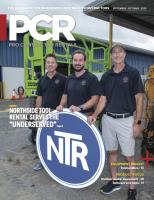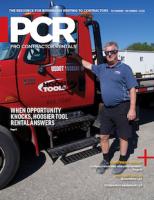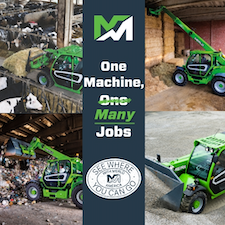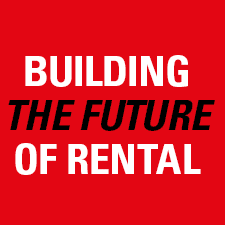Build your business -- Seven ways to improve your rental business
Now is the time to evaluate your fleet utilization and possibly get rid of the under-performers.
by Adam Madsen
It is important to stay focused on what you want your rental business to be, yet be flexible in how you make it happen.
How long has it been since you’ve taken a good look at your business? Is it everything you want it to be?
Follow these seven ways to improve your rental business and watch your goals become a reality.
|
Top online equipment rental searches Kyle Clements, founder and CEO at Quipli, a U.S-based software as a service (SaaS) developer for the equipment and event rental market, conducted online research to identify the relative search frequencies for different pieces of equipment, showing which are in the most demand. Using Ahrefs, an online search engine optimization tool, Clements wanted to find the numbers behind how many people are searching for common construction equipment each month. Here’s what he found: Rental item Average monthly Estimated rental search volume price/day Scaffolding 21,000 $15 to $40 Forklift 13,000 $225 to $750 Trencher 12,000 $125 to $300 Lift 11,000 $100 to $400 Scissor lift 10,000 $100 to $300 Auger 10,000 $25 to $100 Mini-excavator 9,500 $200 to $500 Excavator 9,400 $225 to $750 Sod cutter 9,400 $75 to $125 Backhoe 8,700 $150 to $500 Floor sander 8,600 $50 to $100 Ladder 7,500 $20 to $50 Boom lift 6,700 $250 Heavy equipment 6,500 $400 to $2,000 Log splitter 6,300 $50 to $100 Paint sprayer 5,700 $40 to $120 Crane 4,600 $200 to $1,000 Bucket truck 4,200 $650 to $950 Lawn mower 4,100 $30 to $100 Chainsaw 4,100 $50 to $150 |
1. Sell under-utilized units
Target an overall dollar utilization of your rental fleet, which is the annual rental revenue divided by original equipment cost.
If you rent larger equipment, your target should be at or near 70 percent with general rentals nearing one 100 percent.
At least weekly, run utilization reports using your rental software. Target and analyze items with low (40 percent or less) utilization rates and remove them from your fleet if there is no likely improvement in the next 60 to 90 days.
2. Sell units with maintenance problems
Using your rental software, track your repairs and maintenance expenses as a percentage of rental revenue by individual unit. Any rental unit with 10 percent or more in repairs and maintenance expense as a percentage of annual revenue may be a problem.
Talk with your maintenance staff or provider and if they believe these maintenance problems are likely to continue, it may be time to sell. Down equipment doesn’t make money and unreliable equipment will alienate customers.
3. Extend the life of rental units
Trucks and trailers are lasting longer. Many units continue to be profitable beyond traditional replacement cycles.
In lean years, almost all of the national fleets age their fleet to reduce capital expenditures. Make sure you only extend the life of rental assets that are not currently or likely to be maintenance problems.
4. Consider buying good used equipment
Minimize your capital expenditures by buying late-model used units. This can reduce your capital expenditures, conserve cash and limit your debt.
Typically, a one to four year-old used unit will fetch the same rental rate as a brand new unit. Even a small maintennance investment in a used unit can make it look nearly new and customers will not be able to tell the difference.
5. Supplement your fleet with re-rent equipment
Rather than using your cash or incurring additional debt, develop a relationship with other rental companies or local equipment dealers to provide equipment as needed for a rental.
Make sure you are making a minimum margin of 20 percent on re-rents and make sure that the equipment condition is documented at the time of delivery and again when it comes off rent.
6. Limit discounting
Have a policy on who can discount and by how much. Know your “walk away” rental rate on each piece of equipment. Have a realistic book price and make sure that your overall actual-to-book rate is at least 92 percent.
7. Consider expanding your business: spend money to make money
Acquisitions are an excellent strategy to open up new markets with existing locations, customers and employees.
Over the years, some of the most successful business owners we have seen have grown during times of economic downturn and have dramatically increased their market value.
Above all, continue to challenge yourself and challenge your business model. Business is fluid and your operations should be as well.
-30-
Raised in Anchorage, Alaska, Adam Madsen began his career in the heavy-duty industry as a young man working at Drivetrain Distributors, a third-generation family-owned business. He later went on to work for Transwest, located in Denver, before joining the Karmak team in 2010 as a project analyst in the Research & Design department. He is currently the vice president of Business Solutions at Karmak, an ERP development company.
This article originally appeared in the July-August 2022 issue of Pro Contractor Rentals magazine. ©2022 Urbain Communicaitons LLC. All rights reserved.












